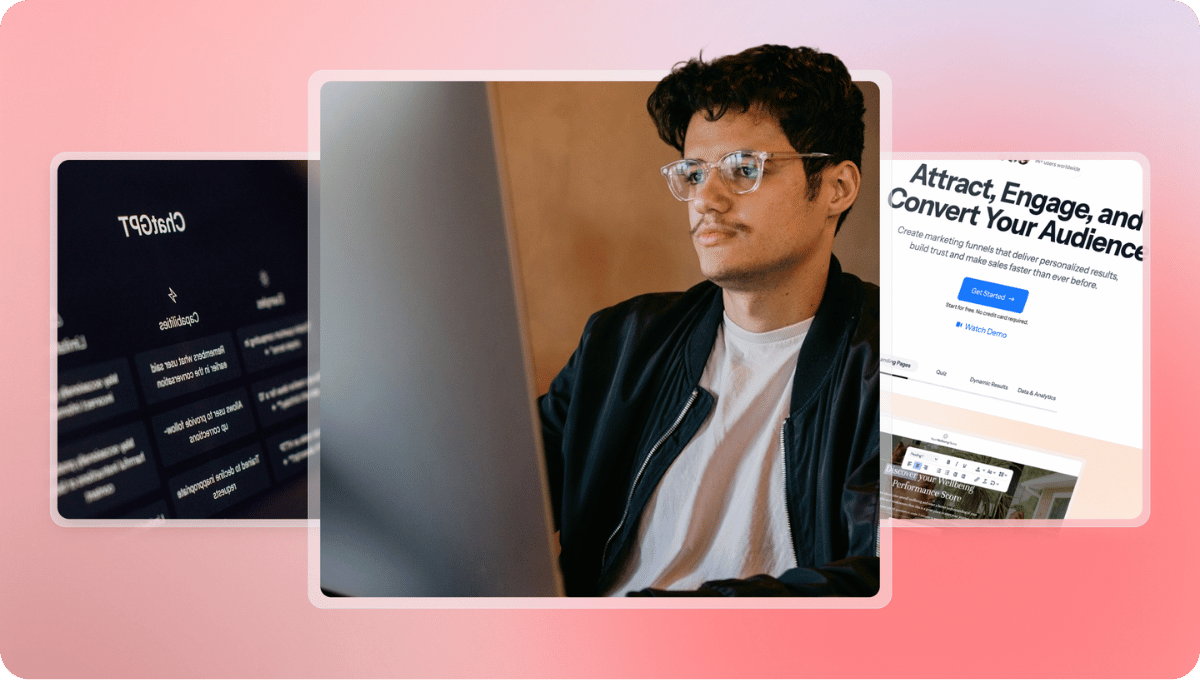
If you’re planning on promoting something online and taking control of your traffic, your main choice is between landing page builders and full website builders. Undecided? Can’t blame you.
No matter which tool you choose, you want to make the most of it and don’t want to waste time creating something that doesn’t suit your goals. So, let’s look at the differences between landing pages and full website builders to find the best option for you.
What are landing page builders?
Landing page builders are tools to create standalone web pages that focus on getting people to complete ONE specific action.
For example, this could be signing up for your lead magnet, subscribing to your newsletter, booking a consultation and so on.
For this reason, landing pages don’t link away from that space and aren’t connected to other web pages. Their goal is to keep their visitors on them (without distractions) and convince them to follow through with one call to action.
When should you use a landing page builder?
You should use a landing page builder for one marketing campaign or goal. It could also be a wiser choice if you want to put something together fast and easily.
Since landing pages are all about conversions (= turning your visitors into subscribers or customers), they’re better suited to:
- Promote a lead magnet
- Sell one service (rather than a varied offer suite), course or digital product
- Promote a waitlist
- Grow your newsletter
- Target your paid ad traffic
Landing pages made with ScoreApp are particularly ideal for promoting a quiz lead magnet. For example:
- Dent uses a ScoreApp landing page for its Key Person of Influence Scorecard. Thanks to strong copy, clear sections and strategic elements (like call-to-action buttons and testimonials), it compels business owners to take the quiz and discover their score
- Boostly chose ScoreApp for its STR Booking Booster Report. A clean layout, videos, intriguing copy… This landing page makes it a no-brainer for its target audience to take action and measure their situation against their competitors
You can also use ScoreApp to collect more data through your landing page in different ways (for example, by asking strategic questions to validate a new offer idea when promoting the waitlist for it).
Key features of landing page builders
- Drag-and-drop interfaces – These blocks make it a breeze to put a landing page together quickly, even if you’ve never done it before. ScoreApp, in particular, has a user-friendly and intuitive interface. You can use our drag-and-drop builder to create your landing page from scratch or personalise our ready-to-go templates
- Conversion rate optimisation (CRO) tools — Because the goal of a landing page is to get its readers to complete one action, these builders include several features to help with that (such as countdown timers, call-to-action buttons, optimised templates or testimonial blocks)
- A/B testing – Show alternative versions of the same landing page to different groups of people, and find out what works best. This is especially important when using paid ads to direct traffic to it (why waste money on something that isn’t performing as well as it could?)
- Lead capture – This could be for a lead magnet, newsletter subscription, webinar sign-up or something else entirely. Either way, most landing pages focus on collecting your audience’s details (their email addresses, in particular) so that you can contact them directly
Popular landing page builders
Some of the best landing page builders are ScoreApp, Unbounce, Leadpages and ClickFunnels.
What are full website builders?

Full website builders are platforms to create entire websites consisting of multiple pages interlinked together (like home, about, contact and so on).
Your visitors will navigate them to browse separate services and products but also to learn more about your business, taking different actions depending on their needs and goals.
When should you use a full website builder?
It’d make more sense to use a full website builder if you need to go beyond a single campaign or goal, sharing more information and covering all stages of the customer’s journey (from awareness to their first purchase).
Specifically, website builders are better suited to:
- Create an entire business website with multiple pages
- Promote more than one service
- Sell products as an eCommerce business
If you’ve heard of one-page websites, you might be wondering whether they’re different from landing pages. They are!
Even though they also involve a standalone page, they don’t focus on one action alone. Instead, they’re divided into sections and offer a more comprehensive overview of your business. So, a full website builder is usually more relevant for those, too.
Another thing to consider is that, with these platforms, you can choose to hire a designer or DIY it. The latter will definitely require more work and technical skills than a standalone landing page. At the same time, using these tools is a lot easier than coding and developing a website from scratch.
Key features of website builders
- Comprehensive design options – These builders tend to offer more templates as well as features that go beyond immediate conversions (like banners, pop-ups, testimonials, portfolios, galleries, contact forms and much more)
- Navigational menu – You’ll want to guide your visitors so they can easily find the right next step for them
- SEO – Most website builders include features to rank on Google and attract customers organically. For example, these can be meta tags, alt text and mobile optimisation, and you can also blog on your website to help with SEO
- Integrations – You usually get to connect your website with other tools like your CRM, payment gateways, booking platforms, email marketing and so on
Popular full website builders
Some of the best website builders are WordPress, Squarespace, Wix and Shopify.
Key differences between landing page builders and full website builders

So, now that you know exactly what landing page builders and full website builders are, which one should you choose?
You might already have a good idea by now, but if you’re still on the fence, here’s a simple breakdown.
1. Scope of use
- Landing page builders are ideal for standalone pages that focus on conversions. So, choose them if you want to work on ONE campaign or get your audience to complete a specific action
- Full website builders are better suited to create more complex websites consisting of several pages. This is particularly relevant when building a professional online presence for your business and catering to multiple goals (like increasing your brand awareness, sharing information, blogging, building trust and promoting your services or products)
2. Technical complexity
- It shouldn’t come as a surprise that landing page builders tend to be easier to use. After all, you’re only creating one page! This makes it quicker to get it all up and running, too. With ScoreApp’s AI quiz builder, you can create your entire landing page and quiz lead magnet in 3 minutes
- Most full website builders are still user-friendly, although their learning curve will change depending on the platform. However, building and maintaining a full website takes a lot more time and effort. Also, going more in-depth (for example, with SEO) requires technical skills or outsourcing to an expert
3. SEO
- With landing page builders, SEO features aren’t a given. So, you’ll need to actively drive traffic to this page with content marketing or paid ads. However, some tools offer SEO, too. Just keep in mind that you’ll only get to target a small selection of keywords since… Well, it’s just one page! With ScoreApp, you can always optimise your landing page for SEO, whether you’re hosting it on an existing website or separately
- Full website builders are better suited to take SEO to the next level: by adding more pages and a blog, you can target many more keywords. Plus, these builders include more in-depth SEO features to facilitate all this
4. Scalability
- Landing page builders are harder to scale. However, they can still work really well if you use them to create a full funnel. For example, with ScoreApp, you can set up a high-converting landing page to promote your quiz lead magnet. Then, by connecting it to your CRM and email marketing platform, you’ll get to keep nurturing your leads and turning them into customers, all automatically
- Full website builders tend to be more scalable. So, this makes them a better option to create an online presence that can grow with your business over time, adding new tools and features when needed
5. Cost
- Landing page builders can be free or cost around £15-£50/month on average (although some can be +£100, too). This really depends on your chosen platform and plan. With ScoreApp, you can create a landing page and quiz for FREE and only move to a paid plan when you actually need more features
- With some full website builders, you can start for free, but it’ll be a very limited plan. Otherwise, expect to pay between £6 and £35/month, with some higher plans being +£100. Don’t forget that, when building a full website, you might have additional costs, too. For example, some of these platforms (like Squarespace) include domain hosting, whereas others don’t (like WordPress). So, they’re only worth it if you’re ready to commit to a long-term investment for a more complete online presence
So, do you need a landing page builder or a full website builder?
The choice between landing page builders and full website builders will depend entirely on your needs and goals, but overall, I’d say:
- Choose a landing page builder for a targeted campaign based on ONE call to action (like promoting a quiz lead magnet or growing a waitlist)
- Choose a full website builder to create a more complex and comprehensive online presence for your entire business, using multiple pages and catering for different goals
Use ScoreApp as a landing page builder or with your website

Are you planning on using a landing page to promote a lead magnet or as the first part of a full funnel that keeps selling for you? Then, the answer is easy: the best choice is ScoreApp.
You’ll get to:
- Create a valuable quiz lead magnet for your audience
- Build a high-converting landing page to encourage more people to take it
- Connect it with your existing CRM, email platform and marketing tools
- Segment your participants based on their answers
- Automate different email sequences for each of them
- Nurture your subscribers in a more personalised and effective way until they’re ready to buy from you
- Get new customers on repeat
This will easily integrate well with the rest of your marketing strategy, and you can choose to build a standalone landing page or host it on an existing website.
Sounds good? Then, create your landing page today and for FREE with ScoreApp.





